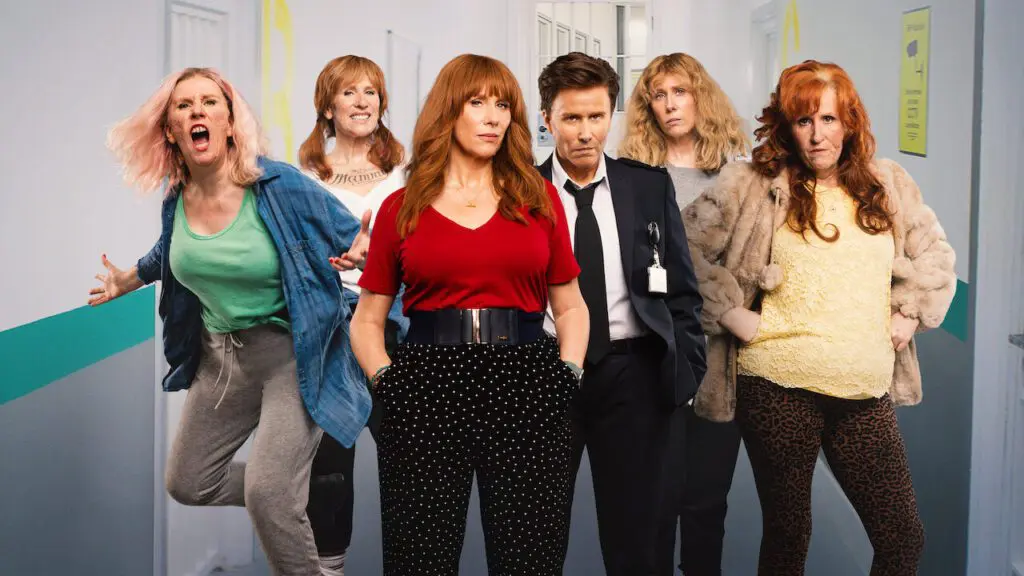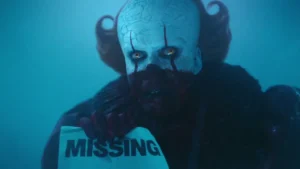Summary
Hard Cell feels like a transplant from the mid-2000s, and its dated structure and attitude hem in one or two good characters and ideas.
This review of Hard Cell Season 1 is spoiler-free.
You know how it is – you wait ages for a Catherine Tate comedy, and then suddenly two come along at once. Unfortunately, neither of them is any good, though both might have been alright in 2004, which it feels like they’ve been plucked from. That’s when Tate first debuted the Nan character she played for the next 12 years on stage and screen, and recently again in a feature-length misfire half a decade too late. Hard Cell, a mockumentary set in a women’s prison in Essex chock full of original characters created and played by Tate herself, has a strain of modernity in some of its dialogue, but mostly plays out like a relic from a bygone era.
I say “original” characters, but that might be overselling it a bit. Tate’s main role, warden Laura, is basically David Brent in a prison instead of an office. Instead of a musician or a comedy genius, she thinks she’s revolutionizing rehabilitation by filtering it through the lens of performance art, which is why she wants the inmates of HMP Woldsley to stage a version of West Side Story, and then an original musical when they realize they don’t have the rights to the former. She brings in Cheryl Fergison from EastEnders, who is playing herself (not that anyone acknowledges it), misappropriates the prison’s plumbing funding on leather-bound lyrics for the songs, and just generally tries to make herself look good.
The main difference is that Laura keeps falling on her feet, which speaks to something else about Hard Cell that works to its detriment – it’s set in a prison that feels like an all-girls school, and never wants to commit to anything serious happening (other than in a finale that takes a sharp turn into much weirder, more dramatic territory, but no spoilers here.) All this means that HMP Woldsley never feels like a real prison, and the prisoners – at least the ones played by Tate herself, which include Ros, a heavily tattooed illiterate “mammy’s girl”, a violent hardcase called Big Viv, and Ange, a wrongly-imprisoned soft touch who is immediately out of her depth – feel like arch caricatures rather than real people. The few who’re played by other actors can’t help but feel as if they would have been better served by a different production that was less reliant on Tate and less committed to easy gags, a lot of them about bodily functions.
A production like this always requires a (relatively) straight man, and Hard Cell offers up Dean (Christian Brassington), Laura’s “number two” who is the first to write her ideas off as ridiculous but feels a lot more petulant and mean-spirited than, say, Tim in The Office, who was a fundamentally decent guy surrounded by eccentrics. The prison setting makes it harder to write off some of the goings-on as totally harmless, since each stereotypical inmate is supposed to represent someone who might very well find themselves incarcerated, and a lot of the slapstick plot points are trying to be about systemic injustice and prison reform. You never had that problem at a paper merchant in Slough. Tate’s comedy style isn’t well-suited to the nuance and seriousness that some of this material requires.
This isn’t to say that Hard Cell isn’t funny – one of Tate’s characters, an androgynous guard named Marco, was a consistent source of laughs for me – or even that the few dramatic moments can’t be stirring, but it rarely feels coherent, and you can feel the script straining to bring ideas together. It certainly doesn’t help that Tate has never seen a well she won’t keep returning to until it’s thoroughly dry, so even in a relatively short runtime of six half-hour episodes, a lot of the show’s humor and ideas feel reiterative – and that’s if they weren’t flagrantly borrowed from elsewhere in the first place.
It’s just not the kind of show that really works anymore, frankly. Everything from its genre to its structure to its arch depiction of every cultural stereotype feels like a transplant from a mid-2000s sketch show, which is understandable since the peak of Tate’s television career was a mid-2000s sketch show. There are some scant pleasures to be had here, but ultimately Hard Cell lives up to its title.




